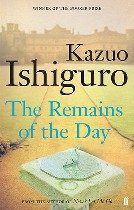 Kazuo Ishiguro •
Kazuo Ishiguro •
The Remains of the Day •
You know you’re in masterful hands from the first page of The Remains of the Day.
Ishiguro couples a diamond-hard intellect with a sensibility that plumbs the depths of the human heart. His precise, sure-footed writing is all the more remarkable when you consider that he is not a native speaker of English, having relocated to the United Kingdom from Japan at the age of five.
The narrator here is a proper British butler named Stevens, fastidious in his expression, perfectly correct, and cold as marble. Nothing seems to penetrate his hermetically sealed existence—not the death of his father, nor aspersions cast on the employer he fiercely protects, nor the widespread devastation of war. The book’s tension derives from the contrast between this polished, glassy veneer and the underlying sorrow, loss, and despair—a silent howl of anguish Stevens is not even aware of emitting.
Along the way we get a clear-eyed look at the conventions underpinning British society on the eve of World War II, a chilling time in Europe. We know what’s coming, but the characters don’t, making every observation charged. Stiff-upper-lip phrases such as “I am sorry to report,” “not entirely devoid of truth,” and “perhaps I might have done better” paint a grim picture of Stevens’s interior world, as do the near constant references to duty that pepper his prose. What remains at day’s end is no more than ashes, burned-out remnants of what once was or could have been in the characters’ lives.
Ishiguro received the Nobel Prize for literature in 2017 for his “novels of great emotional force.” On hearing the news, he said, “It was completely not something I expected, otherwise I would have washed my hair this morning.”






Just recently reread this – your review says it all!